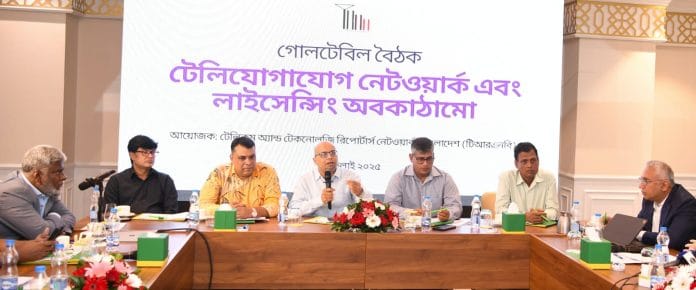The interim government is preparing a new telecom policy aimed at freeing the sector from what officials call 15 years of “fascism” and stagnation.
Faiz Ahmad Taiyeb, Special Assistant to the Chief Adviser on Posts, Telecommunications, and ICT, said the previous policy has been effectively scrapped to make way for a more progressive and inclusive framework.
Speaking at a roundtable titled “Telecom Network and Licensing Policy Reform”, organised by the Telecom and Technology Reporters Network Bangladesh (TRNB) in Dhaka, Tayyeb said the upcoming policy is designed to transform connectivity into next-generation service delivery, aligned with the needs of a new digital generation.
“This policy is being drafted from a mess. It must be detailed and actionable,” he stated.
“In the process, vested interests may be hurt, but the aim is to clean up the sector. Logical suggestions are welcome, and good initiatives by the government should be embraced.”
Taiyeb also criticised telecom operators for prioritising profits over public interest.
“Operators complain despite earning Tk 4 billion in dividends. They must think of the national interest,” he added. However, he stressed that customer interests must come first, while warning that trust deficits among stakeholders and ongoing investment gaps must be addressed.
BTRC Chairman Md. Emdadul Bari affirmed that telecom policy is a sovereign issue, and the government is now taking corrective steps in consultation with stakeholders.
He pointed out that over 90 million individuals and 25 million households remain unconnected.
“Earlier, businesses operated with muscle power. Now our focus is maximising the benefits of connectivity,” he said, assuring that no current licensee would be affected before their license expiry.
The roundtable, part of a series of policy consultation workshops, was chaired by TRNB President Samir Kumar Dey, with welcome remarks by General Secretary Masuduzzaman Robin.
Post and Telecommunications Secretary Md. Zahurul Islam expressed hope that the forthcoming policy would secure the sector’s future for the next 15 years.
However, AMTOB Secretary General Mohammad Zulfikar expressed concern, saying the draft policy is complex and may hinder operators’ ability to meet core objectives. He noted that while it emphasizes innovation and investment, practical feasibility remains unclear. He also flagged concerns over proposed restrictions on foreign ownership and the mandatory 15% local investment threshold.
Still, Zulfikar welcomed provisions like the technology-neutral license regime and a streamlined license structure, which would enable operators to offer voice, data, value-added, and OTT services under one unified license.
Other panelists highlighted the need for consistency and cooperation in policy making. Fiber@Home CIO Suman Ahmed Sabir called for reform of outdated licensing models. FICCI Executive Director TIM Nurul Kabir emphasized better coordination and a balance of local and foreign investment to support the sector’s $600 million annual network cost.
World Bank consultant Mahtab Uddin Ahmed said the policy is directionally right but lacks ambition. He advocated for market-driven pricing and inclusion of MNOs.
ISPAB President Aminul Hakim said ISPs meet 65–70% of the country’s 7.5 TB daily data demand but are burdened with a 15% tax, unlike mobile operators—calling this a significant disparity.
Senior officials from Grameenphone, Banglalink, and Robi also attended, calling for a level playing field and a modern regulatory environment.
Speakers included Grameenphone CEO Yasir Azman and CCO Tanveer Mohammad; Banglalink CEO Erik Aas and CCAO Taimur Rahman; Axiata Group AVP Mohammad Didarul Alam; Robi CCAO Barrister Shahed Alam; Teletalk MD Nurul Mabud; and others from TRNB, FICCI, the World Bank, and ISPAB.

